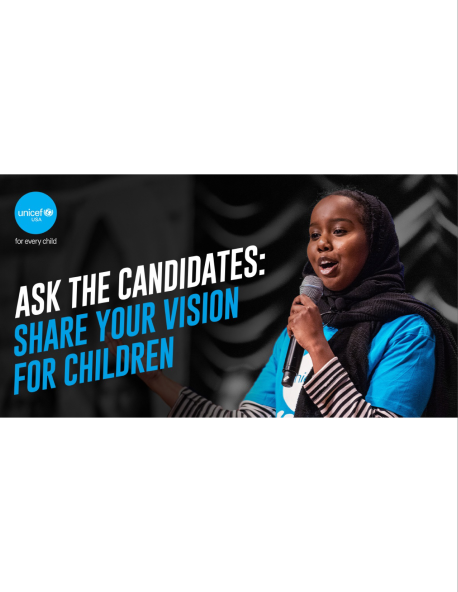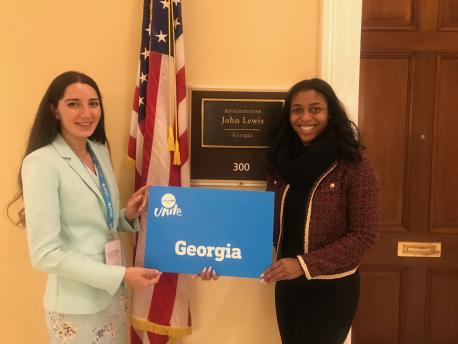
Our Greatest Investment: Girls' Education
OUR GREATEST INVESTMENT: GIRLS’ EDUCATION
Meghana Srivatsa is a UNICEF UNITE member based out of Washington, DC. Her #WHYUNICEF story is centered on girls' education.
My grandmother (or as I call her “Ajji”) would often share with me her morning cup of chai and colorful childhood stories. Ajji was very proud of the evolving spaces for girls, as I took on opportunities that were not available to her at my age. I was so genuinely humbled by her gratitude for my strength as a woman, and our morning chai talks inspired me to continue blazing a trail for girls who are all bright and hungry to learn.
There is still work to be done.
Children account for nearly one-third of trafficking survivors globally. More than 70% of modern slavery survivors are women and girls. A cyclic thread unfolds as modern slavery prevents girls from getting education while a lack of education makes girls more susceptible to modern slavery. In celebration of the recent World Day Against Trafficking, let’s amplify the voices of girls through education, since education can break the poverty cycle and create more sustainable communities worldwide. Children may seem like a fraction of our population, but they are the entirety of our future.
More than 98 million girls around the world are not in classrooms.
Imagine if education fueled girls’ ambition, strengthening their resilience and momentum to be whomever they wanted to be. We would have many more remedies, innovations and solutions for the world. While a child’s education is a fundamental right, girls’ education hasn’t always been prioritized. Securing resources to amplify girls’ voices through education requires us to advocate with both a warm heart and cold facts.
Girls’ education is a sound economic investment.
There is no economic reason for nations not to participate. Barriers to girls’ education cost nations between $15 trillion to $30 trillion in lifetime productivity and earnings. 420 million people would be lifted out of poverty with a secondary education, cutting the number in half. Education is an important milestone for subverting intergenerational poverty. Global evidence proves the vast benefits of education not just for girls, but also for their families and nations.
Girls’ education produces results in many corners of a community.
Girls’ education improves agricultural productivity and reduces the rate of mortality, child marriages, exploitation and more. This investment saves millions of young children since educated women can better negotiate life-saving health care. Girls’ education is a social vaccine against HIV and AIDS. With schooling, female farmers can also improve agricultural output due to innovative technologies.
Education opens opportunities for leadership roles.
In her book I Am Malala, Malala mentions how in Kenya, the rite of passage for male Maasai warriors used to entail killing lions. Now, warriors are those with higher education, including women. Female empowerment contributes to greater advocacy that benefits the life of the community.
Let’s amplify girls’ voices.
As a global community, we are in this together, and education should recognize no barriers. Let’s support learning as it leaps fences to empower young girls because the world listens to a strong mind and relentless work ethic. Success is only as high as the bar we set.
Thank you, Ajji, for your drive to make everything happen for me. You paved a path that opened up worlds of opportunities for your daughters and grandchildren, and I hope to make you proud by supporting the next generation of women. I am excited to tell you about our efforts over our next cup of chai.
HOW TO HELP
There are many ways to make a difference
War, famine, poverty, natural disasters — threats to the world's children keep coming. But UNICEF won't stop working to keep children healthy and safe.
UNICEF works in over 190 countries and territories — more places than any other children's organization. UNICEF has the world's largest humanitarian warehouse and, when disaster strikes, can get supplies almost anywhere within 72 hours. Constantly innovating, always advocating for a better world for children, UNICEF works to ensure that every child can grow up healthy, educated, protected and respected.
Would you like to help give all children the opportunity to reach their full potential? There are many ways to get involved.





